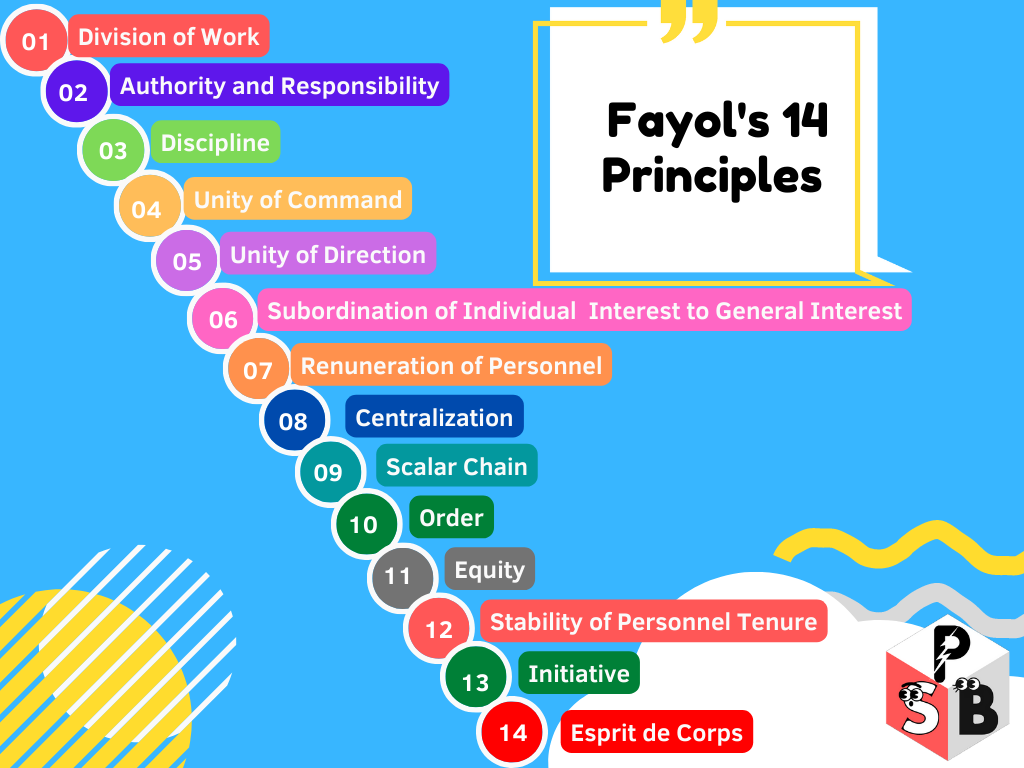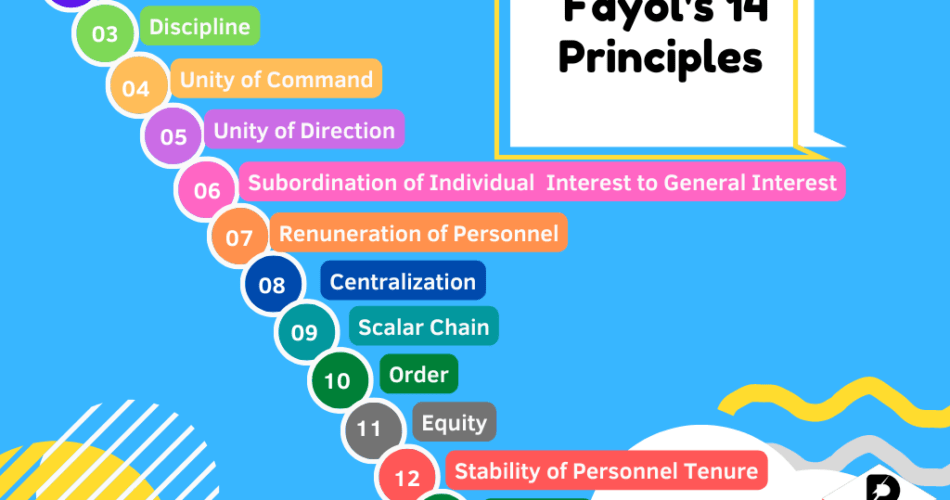Who was Henri Fayol?
Henri Fayol (1841-1925) was a French coal-mine engineer, director of mines and management theoretician. His scientific management theory forms the base for business administration and business management. In the academic world, this is also known as: “Fayolism”.
Henri Fayol provided one of the most influential modern concepts of his time. Fayol has written extensively on technical and scientific matters including mining, engineering and geology. He is founder of the 14 Principles of management and the five functions of management.
In 1916, Fayol published his famous book in French language called “Administration Industrielle Generale.” It was reprinted several times in French and later published in English language under the title, General and Industrial Management in 1929. His paper on ‘The theory of Administration'(1923) is a major contribution to the discipline of public administration.
Theory of Management as given by Henri Fayol
Fayol developed the first complete theory of management and is considered as the founder of the management process school. He looked at management as a universal set of principles applicable to any kind of functional and organizational setting.
Fayol rejected the traditional distinction between management (confined to commercial enterprises) and administration (confined to government) as misleading and advocated that we are no longer confronted with several administrative sciences, but with one which can be applied equally well to public and to private affairs. (Pugh, 1976)
6 Types of Activities of Industrial Undertaking
Fayol divided the activities of an industrial undertaking into six types:
- Technical Activities: Production, manufacture, adaptation
- Commercial Activities: Buying, selling, exchange
- Financial Activities: Creation and optimum use of capital
- Security Activities: Protection of human and material resources
- Accounting Activities: Balance sheets, cost, stock-verification
- Managerial Activities: Planning, organization, command, control and coordination. (Fayol, 1937)

Concept of Management as explained by Fayol
To Fayol, management is the most important activity, it integrates all other activities. Management arranges processes, material, resources and people into a structural hierarchy for accomplishing organizational objectives. Management plays a very important part in the government of undertakings; of all undertakings, large or small, industrial, commercial, political, religious or other.
6 Must Qualities for Manager
Fayol lists the following qualities for manager:
- i] Physical: health, vigour and appearance
- ii] Mental: understanding, adaptability and judgement
- iii] Moral: firmness and willingness to accept responsibility
- iv] General Education: acquaintance with general matters
- v] Special Knowledge: knowledge of special functions like, technical, commercial financial or managerial
- vi] Experience: knowledge arising from the work proper. (Fayol, 1937)
POCCC Model of Manager’s Functions
Fayol also discussed manager’s function through ‘POCCC’ – Planning, Organisation, Command, Coordination and Control.
Planning: The most important function of manager; enables the separation of short-run events from long-term perspectives. Unity, continuity, flexibility and precision are basic features of a good plan (Fayol:43-45)
Organisation: It stands for providing necessary human and material resources necessary for organisation’s functioning. It also involves scientific selection and motivation of workers.
Command: It rests on certain personal qualities and knowledge of the general principles. It’s purpose is to generate unity, initiative and loyalty among employees.
Coordination: It is a necessary precondition of all successful management. It refers to the orderly arrangement of group effort, to provide unity of action in the pursuit of a common purpose.
Control: The purpose of control is to obtain conformity with the plan adopted, the instruction issued and principles established. Control must be done within a reasonable time and be followed by positive and negative sanctions-carrot and stick approach.
Fayol’s Fourteen Principles

Fayol in his book, General and Industrial Administration, propounded fourteen principles of organization listed below:
1. Division of Work
This principle proposes that work can be performed more efficiently and more productively if it is divided into smaller elements and specific elements are assigned to specific workers./Thus, the dominant thought in designing job was specialization, each employee performing a specific task, as opposed to generalization, where each employee performs multiple tasks. Fayol however, pointed out that division of work should be in right proportion, since it has limitations which should not be exceeded.
2. Authority and Responsibility
Managers required formal and/or informal authority to carry out their managerial responsibilities – they required the authority, commensurate with responsibility, to give orders so that tasks can be accomplished. Organization should implement safeguards against managers’ abuse of authority.
3. Discipline
This principle, suggests that, along with good supervisors at all levels; organizations require a set of clearly defined rules and procedures aimed at attaining good employee discipline and obedience.
4. Unity of Command
This is the “one man, one boss” rule. For any action whatsoever, an employee should receive orders from one boss only. If task and related responsibilities are given to the employee by more than one manager, this may lead to confusion which may lead to possible conflicts for employees. By using this principle, the responsibility for mistakes can be established more easily.
5. Unity of Direction
This principle proposes that there should be only one plan and one boss for each group of activities having the same objective. All activities must be carried out by one group that forms a team. These activities must be described in a plan of action. The manager is ultimately responsible for this plan and he monitors the progress of the defined and planned activities. Focus areas are the efforts made by the employees and coordination.
6. Subordination of Individual Interests to the General Interest
The goals of the organization must take precedence over the interests of individuals in the organization. Fundamentally, this principle proposes that employees must sacrifice their interests for the good of the organization. Thus, an organization should employ only individuals who are fully committed to its objectives and are willing to readily comply with its mandates.
7. Remuneration of Personnel
Compensation for work done should be reasonable to both the employee and the organization, and it should be sufficiently motivational – do not underpay nor overpay employee. There are two types of remuneration namely non-monetary (a compliment, more responsibilities, credits,) and monetary (compensation, bonus or other financial compensation). Ultimately, it is about rewarding the efforts that have been made.
8. Centralization
This principle suggests that too much centralization leads to organizational ineffectiveness, and so does too much decentralization. Thus, organizations must attain a balance between centralization and decentralization. An approach used to attain the balance is to have upper- level managers establish broad strategic plans and policies and to have the interpretive decisions of the plans and policies made by lower-level managers in the form of tactical plans and procedures.
9. Scalar Chain
This principle, sometimes referred to as “the hierarchy principle,” suggests that communication in organizations should be basically vertical: that a single, uninterrupted chain of authority should extend from the highest level to the lowest position in the organization. And there should be horizontal communication only when the need arises and permission from superiors has been obtained. Fundamentally, the principle aims to facilitate
formal organizational controls.
10. Order
One interpretation of this principle is that in organizations there should be a place for everything and everything should be in its place. Another interpretation is that an organization’s materials should be in the right place at the right time, and its employees should be assigned to the jobs best suited to them. Basically, the principle provides a form of formal organizational
control.
11. Equity
Equity means fairness. The fairness that results from managers being kind and just toward their subordinates will lead to devoted and loyal service. This principle proposes that organizations require employee commitment and compliance. Employees must be in the right place in the organization to do things right. Managers should supervise and monitor this process and they should treat employees fairly and impartially.
12. Stability of Personnel Tenure
Training new employees takes time and it is expensive. A high rate of employee turnover would thus be inefficient and should be avoided. Management strives to minimize employee turnover and to have the right staff in the right place. Focus areas such as frequent change of position and sufficient development must be managed well.
13. Initiative
Organizations required managers who possess the ability to conceive new ideas as well as the ability to implement them. Henri Fayol argued that with this management principle employees should be allowed to express new ideas. This encourages interest and involvement and creates added
value for the company.
14. Esprit de corps
The maintenance of high morale and unity among employees is imperative. Managers are responsible for the development of morale in the workplace; individually and in the area of communication. Esprit de corps contributes to the development of the culture and creates an atmosphere of mutual trust and understanding. (Fayol, 1937)

